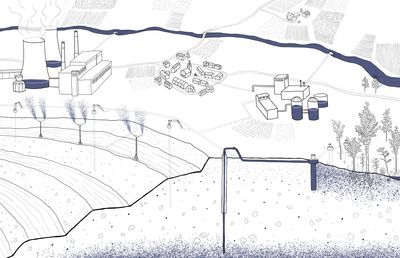Energy and WaterEternity Burdens of Groundwater ExploitationNora Hauser, Leonie Mischler, and Andela Pejic

The brown coal mining in the Rheinische Revier has transformed the physical fabric of the region substantially since 1950. While the three open mining pits – Inden, Hambach and Garzweiler – are visible indicators for these transformation processes in the landscape, others are far more invisible, such as the alterations in the groundwater system.
RWE currently operates a complex water infrastructure pumping away groundwater to extract brown coal. This groundwater lowering cannot be limited to the open pit but influences the region beyond Germany’s borders. Half of the pumped groundwater is used by RWE as service water for brown coal mining, as substitute drinking water for the communes or as infiltration in groundwater-dependent wetlands. The lowering of groundwater in the region causes problems such as drying up of wetlands, ground lowering and lacking groundwater in public water supply facilities. Unlike other groundwater users, RWE was exempt from the water extraction fee until 2011, which meant that this exploitation of the natural resource groundwater also generated a financial profit of 25 million Euros annually since 1950.
With the decision of the Bundestag to end brown coal mining in North Rhine-Westphalia by 2030 many questions remain open: how will the future look like, who decides in the future and who will pay the price.
RWE has a clear vision of transforming the three open pit mines into lakes, which should act as leisure activity and recreation area for locals and attract tourist into the region. Their scenarios give the impression that RWE will leave the landscape in good condition and all the issues caused by brown coal mining will be history by 2090. Problems such as flooding, toxic groundwater and water shortage due to climate change are not being addressed in these future scenarios. According to its own information, RWE has set aside only 165 million Euros to deal with the water management consequences after brown coal mining ends until groundwater levels are restored to its original level in 2380. Considering the time span and the financial resources set aside, there is a risk that future costs will be passed on to the taxpayer. RWE must therefore be obliged to pay an appropriate amount into a fund to be set up under public law. The damages caused by RWE are no longer consequential damages by brown coal mining, but need to be addressed as eternal burdens. In any event, the decisive factor in the future will not be the hasty vision of a lake as a recreational destination and a real-estate opportunity, but the inclusive and participatory process of healing the territory and the landscape and meeting the needs of all its inhabitants.